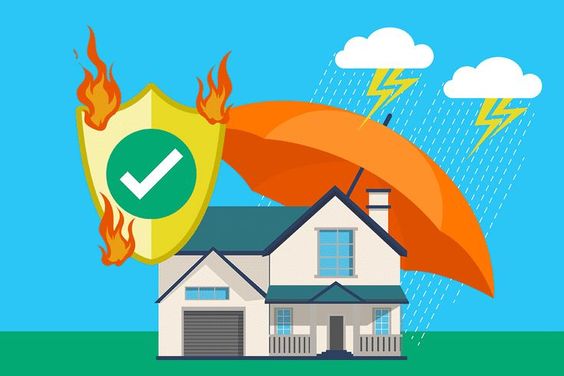What Is Hazard Insurance
Hazard insurance, also known as homeowners insurance, is a type of insurance policy that provides financial protection to homeowners against damage to their property caused by specific hazards or perils. These hazards typically include events such as fire, theft, vandalism, and certain natural disasters like hurricanes, tornadoes, and earthquakes, depending on the terms of the policy.
Hazard insurance covers the structure of the home itself, as well as other structures on the property, such as detached garages or sheds. It also often includes coverage for personal belongings within the home, as well as liability protection in case someone is injured on the insured property and decides to sue the homeowner. Read about What is Infinite Banking
Understanding Hazard Insurance Coverage
What Does Hazard Insurance Cover?
Hazard insurance typically covers damage or loss to the physical structure of your home, including attached structures like garages or sheds. It also extends coverage to personal belongings within the home, such as furniture and electronics. Additionally, hazard insurance may offer liability protection in case someone is injured on your property.

Types of Hazards Covered
Common hazards covered by hazard insurance include fire, lightning, windstorms, hail, theft, vandalism, and certain types of water damage. However, coverage for specific hazards may vary depending on the insurance policy and geographical location. Discover about Why Annuities are Bad Investments
Importance of Hazard Insurance
Protecting Your Property Investment
Hazard insurance serves as a safety net for homeowners by providing financial assistance to repair or rebuild their property in the event of damage or destruction. Without adequate coverage, homeowners could face significant financial burdens trying to recover from such incidents.
Fulfilling Lender Requirements
Most mortgage lenders require borrowers to have hazard insurance as a condition of the loan. Lenders want to ensure that their investment is protected against potential risks, and hazard insurance helps mitigate that risk. Learn about Why IUL is a Bad Investment
Key Differences Between Hazard Insurance and Homeowners Insurance
Coverage Scope
While hazard insurance primarily focuses on protecting the structure of the home and personal belongings, homeowners insurance offers broader coverage. Homeowners insurance typically includes additional coverage for liability protection, personal property, and living expenses in case of temporary displacement.
Policy Cost
Hazard insurance premiums are generally lower compared to homeowners insurance premiums due to the narrower scope of coverage. However, the cost may vary based on factors such as the property’s location, age, construction materials, and coverage limits.
Factors Influencing Hazard Insurance Premiums
Location
The location of your property plays a significant role in determining hazard insurance premiums. Properties located in high-risk areas prone to natural disasters or crime may have higher premiums compared to those in low-risk areas.
Property Type
The type of property you own, such as a single-family home, condominium, or rental property, can affect insurance premiums. Factors such as the property’s age, size, and condition also influence the cost of coverage.
Coverage Limits
The amount of coverage you choose for your hazard insurance policy directly impacts the premiums. Higher coverage limits typically result in higher premiums, but it provides more comprehensive protection in case of a hazard event.
How to Obtain Hazard Insurance
Working with Insurance Agents
Insurance agents can help homeowners navigate the process of obtaining hazard insurance by assessing their needs and recommending suitable coverage options. They can also assist in comparing quotes from different insurance companies to find the best policy at the most competitive price.

Comparing Quotes
It’s essential to obtain quotes from multiple insurance providers to ensure you’re getting the best value for your hazard insurance coverage. Comparing quotes allows you to evaluate different policy features, coverage limits, and premiums before making a decision.
Conclusion
Hazard insurance is a critical aspect of homeownership that provides financial protection against various hazards and perils. By understanding the coverage it offers and the factors influencing premiums, homeowners can make informed decisions to safeguard their property investment. Working with insurance professionals and regularly reviewing and updating hazard insurance policies ensures continued peace of mind for homeowners.
FAQs
- What hazards does hazard insurance typically cover?
- Hazard insurance typically covers perils such as fire, theft, vandalism, windstorms, hail, and certain types of water damage.
- Is hazard insurance mandatory?
- While hazard insurance is not legally required in all states, most mortgage lenders require it as a condition of the loan to protect their investment.
- Can hazard insurance be bundled with other insurance types?
- Yes, hazard insurance can often be bundled with other insurance types such as homeowners insurance or umbrella insurance to provide comprehensive coverage.
- How often should hazard insurance be reviewed and updated?
- It’s recommended to review and update hazard insurance policies annually or whenever significant changes occur to ensure adequate coverage.
- What happens if a hazard event occurs and I don’t have hazard insurance? Without hazard insurance, homeowners would be responsible for covering the costs of repairing or rebuilding their property out of pocket, which could result in financial hardship.







